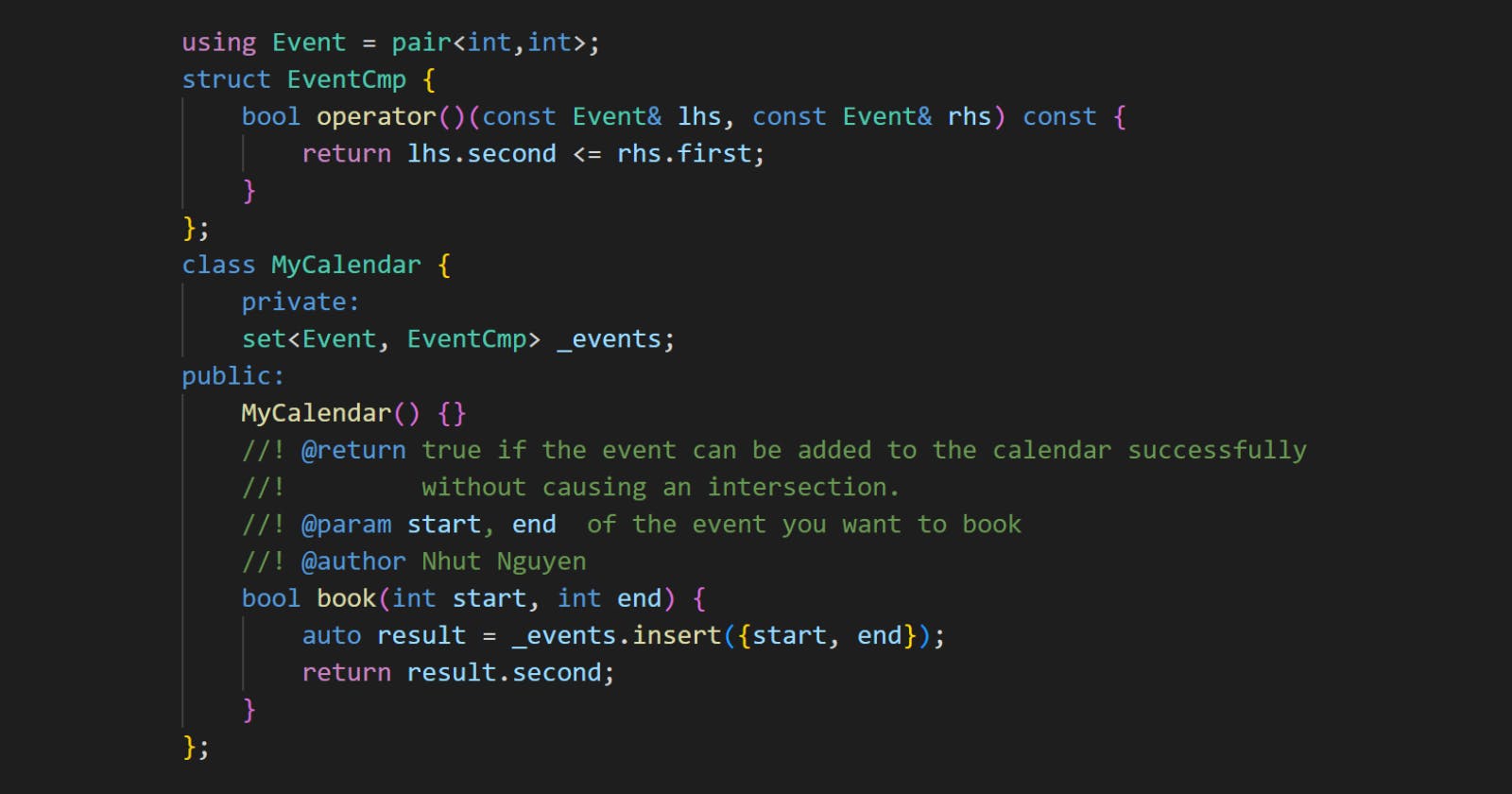Problem statement
You are implementing a program to use as your calendar. We can add a new event if adding the event will not cause a double booking.
A double booking happens when two events have some non-empty intersection (i.e., some moment is common to both events.).
The event can be represented as a pair of integers start and end that represents a booking on the half-open interval [start, end), the range of real numbers x such that start <= x < end.
Implement the MyCalendar class:
MyCalendar()Initializes the calendar object.boolean book(int start, int end)Returnstrueif the event can be added to the calendar successfully without causing a double booking. Otherwise, returnfalseand do not add the event to the calendar.
Example 1
Input
["MyCalendar", "book", "book", "book"]
[[], [10, 20], [15, 25], [20, 30]]
Output
[null, true, false, true]
Explanation
MyCalendar myCalendar = new MyCalendar();
myCalendar.book(10, 20); // return True
myCalendar.book(15, 25); // return False. It can not be booked because time 15 is already booked by another event.
myCalendar.book(20, 30); // return True, The event can be booked, as the first event takes every time less than 20, but not including 20.
Constraints
0 <= start < end <= 10^9.At most
1000calls will be made to book.
Solution 1: Vector
You can store the booked events in a vector and check the intersection condition whenever you add a new event.
Code
#include <iostream>
#include <vector>
using namespace std;
class MyCalendar {
private:
vector<pair<int,int>> _events;
public:
MyCalendar() {}
bool book(int start, int end) {
for (auto& e : _events) {
if (!(e.second <= start || end <= e.first)) {
return false;
}
}
_events.push_back({start, end});
return true;
}
};
int main() {
MyCalendar c;
std::cout << c.book(10, 20) << std::endl;
std::cout << c.book(15, 25) << std::endl;
std::cout << c.book(20, 30) << std::endl;
}
Output:
1
0
1
Complexity
Runtime:
O(N), whereN = _events.length.Extra space:
O(N).
Solution 2: Set
Since the events have no intersection, they can be sorted. You can also consider two events to be the same if they intersect.
With that in mind, you can use std::set to store the sorted unique events.
Code
#include <iostream>
#include <set>
using namespace std;
using Event = pair<int,int>;
struct EventCmp {
bool operator()(const Event& lhs, const Event& rhs) const {
return lhs.second <= rhs.first;
}
};
class MyCalendar {
private:
set<Event, EventCmp> _events;
public:
MyCalendar() {}
bool book(int start, int end) {
auto result = _events.insert({start, end});
return result.second;
}
};
int main() {
MyCalendar c;
std::cout << c.book(10, 20) << std::endl;
std::cout << c.book(15, 25) << std::endl;
std::cout << c.book(20, 30) << std::endl;
}
Output:
1
0
1
Complexity
Runtime:
O(logN), whereN = _events.length.Extra space:
O(N).
References
Thanks for reading. Feel free to share your thought about my content and check out my FREE book “10 Classic Coding Challenges”.

